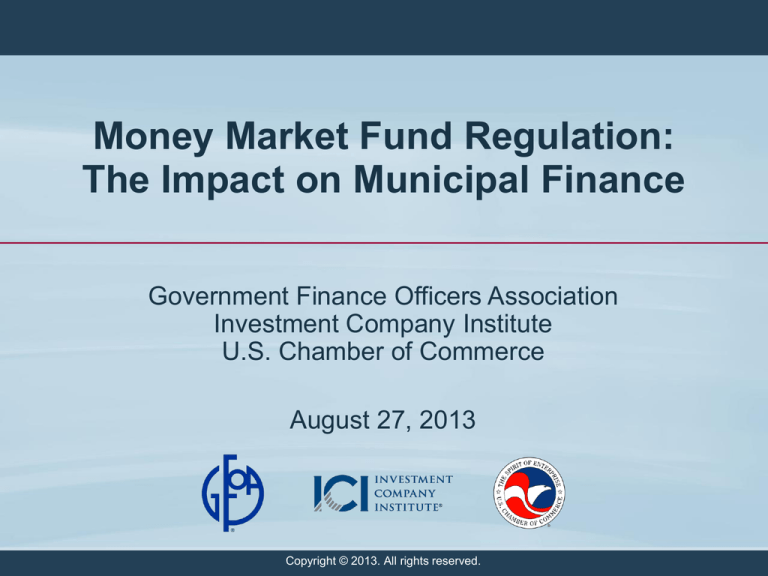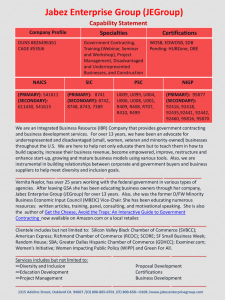
Money Market Fund Regulation:
The Impact on Municipal Finance
Government Finance Officers Association
Investment Company Institute
U.S. Chamber of Commerce
August 27, 2013
Copyright © 2013. All rights reserved.
Agenda
• Speakers
• Key Role of Money Market Mutual Funds in the U.S.
Economy and Municipal Finance
•
•
•
•
•
The SEC Proposal and Its Implications
The Public Investor’s Viewpoint
Campaign Efforts
Next Steps: What Can You Do?
Questions
1
Speakers
• Alice Joe
Executive Director, Center for Capital Markets
Competitiveness, U.S. Chamber of Commerce
• Jane Heinrichs
Senior Associate Counsel, Investment Company Institute
• Kathryn Hewitt
Treasurer, Harford County, Maryland
Member, Government Finance Officers Association
2
Key Role of Money Market Mutual Funds in
the U.S. Economy and Municipal Finance
• $2.6 trillion in assets
• An efficient cash management tool for treasurers and
finance officials in:
State and local governments
Corporations and other businesses
Colleges, universities, and other nonprofits
• State and local governments hold more than
$120 billion of their short- and mid-term investments in
money market funds.
3
Key Role of Money Market Mutual Funds in
the U.S. Economy and Municipal Finance
• A significant investor in corporate commercial paper,
holding more than one-third of all outstanding CP
• The largest investor in short-term municipal securities
4
The SEC Proposal and Its Implications
• Origins of the SEC proposal on money market funds
2008 financial crisis: pressure on prime money market
funds
2010 SEC reforms for money market funds
November 2012: Financial Stability Oversight Council
issues recommendations for money market funds
• SEC in 2012–2013
Economic study published, November 2012
SEC Chairman Mary Jo White sworn in, April 2013
New proposal issued, June 2013
Comments due September 17, 2013
5
The SEC Proposal and Its Implications
• Two fundamental policy alternatives, which could be
adopted alone or in combination
Floating net asset values (NAVs)
Liquidity fees and redemption gates
• Other significant reforms that would apply under either
alternative
Enhanced standards on disclosure and reporting,
diversification, and stress testing
6
The SEC Proposal and Its Implications
• Floating NAV alternative
Prime and tax-exempt institutional funds must adopt
floating NAV
Retail funds (defined as funds that limit redemptions per
shareholder to $1 million or less per day) exempted
U.S. government funds (Treasury, U.S. agency) also
exempted
7
The SEC Proposal and Its Implications
• Implications of SEC floating NAV proposal
Loss of simplicity, benefits for many fund investors
Accounting and tax issues: tracking daily gains and
losses
Operational complexity: costly system changes for funds,
investors, and intermediaries (e.g., broker-dealers,
retirement plans)
Net effect of new complexities: many investors and
intermediaries will exit money market funds.
8
The SEC Proposal and Its Implications
• ICI view: Like government funds, tax-exempt funds
should be excluded from any floating NAV requirement.
History shows that tax-exempt funds are not vulnerable
to significant redemptions in times of market stress.
• In September 2008, net redemptions from tax-exempt
money market funds totaled 7.5 percent of their assets as
of August 2008.
Tax-exempt funds hold enormous amounts of liquidity.
• As of March 2013, tax-exempt funds had $213 billion in
weekly liquidity, 78 percent of their total assets.
Tax-exempt funds provide significant benefits to the
economy.
9
The Public Investor’s Viewpoint
• Why do cash/investment managers of state and local
governments use money market funds?
Daily cash management—keep your money invested
Daily liquidity—unexpected events
Safety and security
Operational ease for accounting/recordkeeping
Hiring investment expertise at a low cost
Access to a broader group of investment securities
10
The Public Investor’s Viewpoint
• Why do cash/investment managers of state and local
governments use money market funds?
State or local investment requirements may make other
alternatives difficult to execute.
Bank sweep products may sweep into money market
funds.
Local Government Investment Pools (LGIPs) often use
money market funds for part of their liquidity
requirements.
11
The Public Investor’s Viewpoint
• How do these proposed changes impact the
institutional investor?
Floating NAV causes many operational concerns.
Additional recordkeeping—costly system changes
Increased transaction costs
Increased workload to handle daily investments
Increased risk by pushing investors into riskier less
liquid/lower credit-quality investments
Different treatment of institutional versus retail investors
Accounting rules do not require market value or fair
value reporting of investments with maturities less than a
year.
12
The Public Investor’s Viewpoint
• Effect on LGIPs
Decision for each LGIP on whether to make the same
changes—not regulated by the SEC
Rating agency actions
Conflict with GASB rules
Costly system changes
Use of money market funds within LGIPs
13
The Public Investor’s Viewpoint
• Money market funds as a purchaser of tax-exempt
securities
Money market funds purchase about 72 percent of
short-term tax-exempt securities issued by state and
local governments.
Fewer purchasers would increase borrowing costs for
local governments, which increases the cost of the
capital infrastructure.
14
The Public Investor’s Viewpoint
• Tax-exempt money market funds should have the same
treatment as government money market funds.
SEC proposal favors financing the federal government
over the funding needs of state and local governments.
It is important to the taxpayer that all governmental
financing achieve the lowest cost.
15
Campaign Efforts
16
Campaign Efforts: Who has spoken out?
STATE AND LOCAL GOVERNMENT
BUSINESS
Association of Indiana Counties, Inc.
Colorado County Treasurers Association
Council of Development Finance Agencies
Council of Infrastructure Financing Authorities
County Commissioners Association of Pennsylvania
County Commissioners’ Association of Ohio
County Treasurers Association of Ohio
Government Finance Officers Association
International City/County Management Association
International Municipal Lawyers Association
Metropolitan Mayors Caucus
National Association of Counties
National Association of Health and Educational Facilities Finance Authorities
National Association of Local Housing Financing Agencies
National Association of State Auditors
National Association of State Treasurers
National Council of State Housing Agencies
National League of Cities
New Hampshire State Treasurer
New Jersey Association of Counties
New Jersey State League of Municipalities
New Mexico Association of Counties
New York State Association of Counties
Port of Houston Authority
State of Rhode Island General Treasurer
Tennessee Municipal League
Texas Municipal League
The Pennsylvania League of Cities and Municipalities
U.S. Conference of Mayors
Utah Association of Counties
Utah League of Cities & Towns
Utah State Treasurer
Associated Industries of Florida
Associated Oregon Industries
Association for Financial Professionals
Business Council of New York State
Cincinnati Chamber of Commerce
Dallas Chamber of Commerce
Financial Executives International
Financial Services Institute
Financial Services Roundtable
Florida Chamber of Commerce
Greater Albuquerque Chamber of Commerce
Greater Boston Chamber of Commerce
Greater Pittsburgh Chamber of Commerce
Greater Providence Chamber of Commerce
Greater Raleigh Chamber of Commerce
Greater Springfield Chamber of Commerce
Indiana Chamber of Commerce
Jacksonville Regional Chamber of Commerce
Kentucky Chamber of Commerce
Massachusetts Chamber of Commerce
Midland Area Chamber of Commerce
Mohawk Valley Chamber of Commerce
National Association of Corporate Treasurers
National Shooting Sports Foundation
New Jersey Chamber of Commerce
New Mexico Association of Commerce and Industry
North Carolina Chamber
Northern Kentucky Chamber of Commerce
Pennsylvania Chamber of Business and Industry
Retail Industry Leaders Association (RILA)
Rowan County Chamber of Commerce
Texas Association of Business
17
Next Steps: What Can You Do?
• Comment period open until September 17
• Take action now!
Send a letter to the SEC
Mayors: add your name to the sign-on letter
Weigh in with members of Congress
Meet with SEC staff and commissioners
Spread the word with colleagues
18
Next Steps: What Can You Do?
• Get more information and sample letters
www.MoneyMarketFundReform.com (U.S. Chamber)
www.PreserveMoneyMarketFunds.org (ICI)
• Submit comments by September 17
Visit www.sec.gov/spotlight/money-market.shtml
Visit www.PreserveMoneyMarketFunds.org
19
Questions
20







